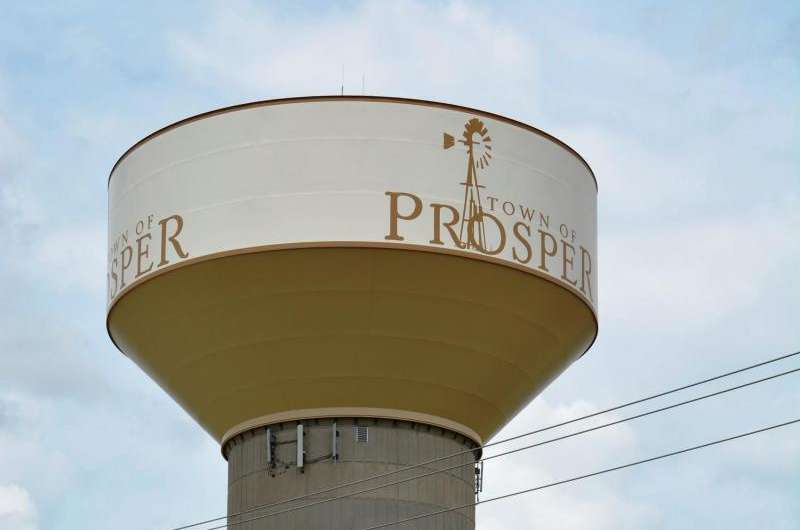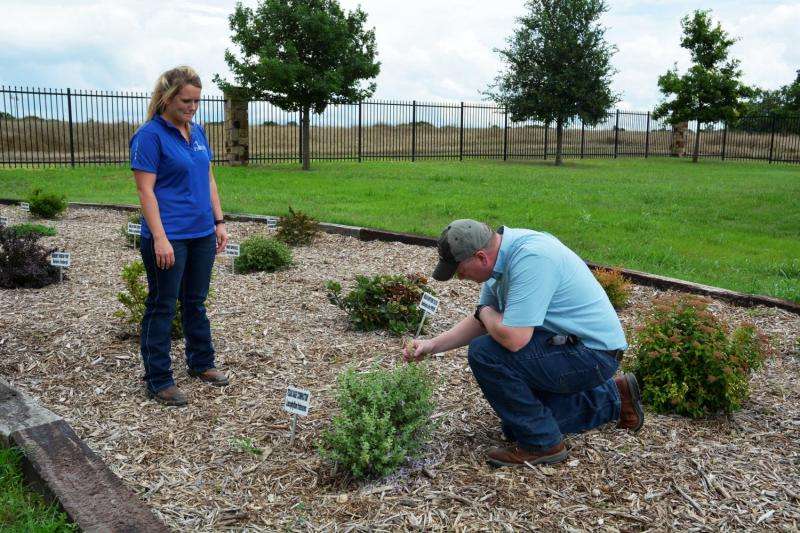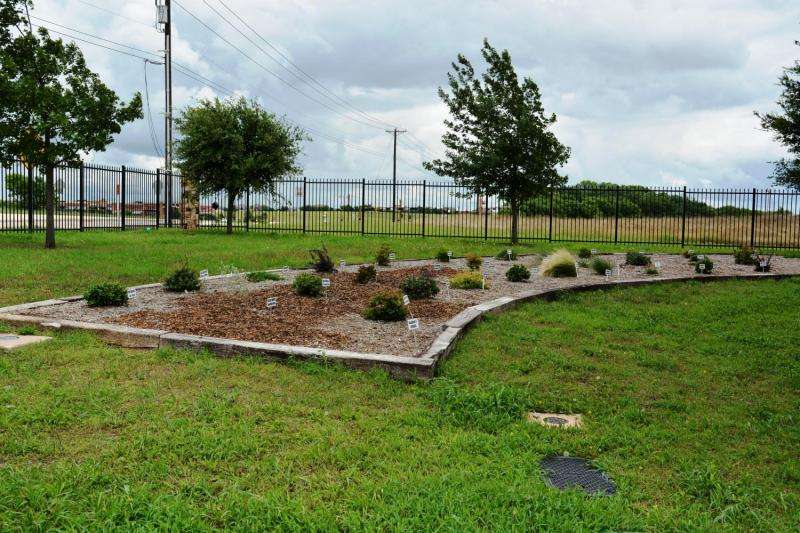Earth-Kind plants 'prosper' as environmentally sound choices

Earth-Kind trials of dwarf ornamental plants in the town of Prosper, near Dallas, will provide valuable information on how to conserve water and reduce chemical use in landscaping, said Texas A&M AgriLife Extension Service experts.
Since last year, Dr. Greg Church, AgriLife Extension agent for horticulture in Collin County, has been working with the town of Prosper to conduct trials of dwarf ornamental shrubs and grasses in plots established around the town's water tower. The shrubs have been planted in accordance with Earth-Kind principles.
"Earth-Kind is a registered trademark of AgriLife Extension," explained Dr. Steve George, AgriLife Extension landscape specialist in Dallas, who has been collaborating with Church on the trials. "Earth-Kind principles have been in use since the 1990s and emphasize environmental responsibility through water conservation and a reduction in fertilizers and pesticides."
The Earth-Kind dwarf shrub and ornamental grass trials at Prosper began Oct. 1, 2015, Church said.
"I believe the fall is a great time to install woody and herbaceous perennials, because they can establish a root system during the cooler months and be better prepared for the summer heat the following year," he said. "We plan to continue the trial for at least five years."
He said other Earth-Kind trials in the Dallas area have been in place for up to seven growing seasons. He has been encouraged by the long-term success of the Earth-Kind approach to managing the landscape.

Church said 15 varieties of dwarf ornamental shrubs, along with six varieties of ornamental grasses, were planted around the tower to determine which varieties would literally prosper with a small amount of water and no chemical inputs.
The types of shrubs planted were dwarf yaupon holly, dwarf Chinese holly, Carissa holly, 'Gulfstream' dwarf nandina, 'Crimson Pygmy' barberry, 'Rose Creek' abelia , 'Purple Pixie' fringe flower, 'Olivia' Indian Hawthorn, 'Cherry Dazzle' crape myrtle, Blue Pacific Shore juniper, 'Anthony Waterer' spirea, Japanese boxwood, 'Compactum' Texas sage, 'Autumn Sangria' azalea and 'Kaleidoscope' abelia. Ornamental grasses planted were 'Evergreen Giant' liriope, seep muhly, 'Hamlin Dwarf' fountain grass, Mexican feather, gulf muhly and "Adagio" dwarf maiden grasses.
"The dwarf shrubs were planted with four repetitions of the 15 varieties and there are three repetitions of ornamental grasses that separate the repetitions of shrubs," Church explained. "Dwarf ornamentals offer a great choice for Earth-Kind landscaping since they are more compact and require far less pruning."
Church coordinated with the town of Prosper to establish his trial plots. His primary contact has been Tristan Cisco, administrative assistant and water education coordinator with the town's public works department.
"The director of our department decided it would be best to put the trial garden at one of our public works sites," Cisco said. "We decided on this site as it would be a little better protected than if we put it in a park or other location."
She said the site still allows the public to enter and learn about the trials.

"We host educational classes here in the garden and give tours so people can see firsthand that it's possible to have a beautiful landscape with limited water use," she said.
Church said the location of the water tower is appropriate as reduced water use is one of the hallmarks of Earth-Kind landscaping.
"The shrub and grass trials are still in the establishment phase, meaning they get regularly watered in the absence of natural rainfall during the first year," he said. "Starting next year, we will reduce the irrigation frequency tremendously to see how far we can take the plants."
He said in past studies with other plants, irrigation was reduced to once per year using the Earth-Kind soil management system.
"I believe some of the plants will be able to survive very limited irrigation once they have time to establish in the landscape," he said.
Church noted that while the trials have not been going on long, the excessive rain earlier this year appears to have negatively impacted some species, particularly Indian Hawthorn.
"But this is a long-term study and there's still a lot more to learn about how these shrubs will do over time," he said.
Provided by Texas A&M University

















